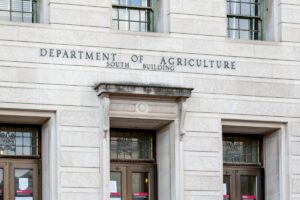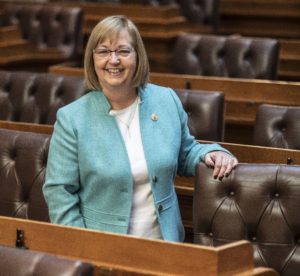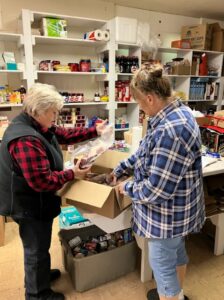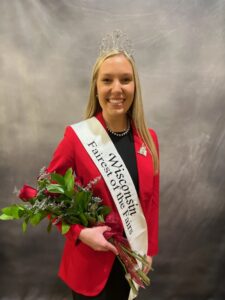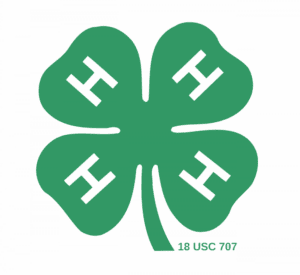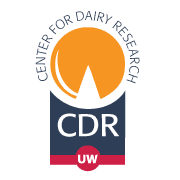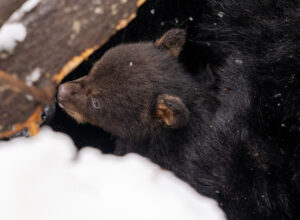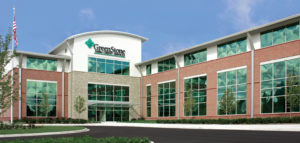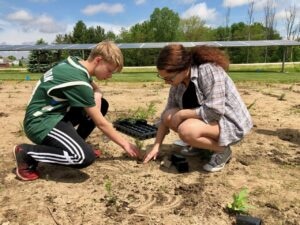USDA Starts First Step In 2027 Ag Census
USDA’s National Agricultural Statistics Service will conduct the National Agricultural Classification Survey starting Jan. 24.
The survey is a step in determining who should receive a 2027 Census of Agriculture questionnaire. It will go to approximately 250,000 recipients to ask if they conduct agricultural activity. The results will ensure that every U.S. producer counts, no matter how large or small their operation.
“This survey helps illustrate the breadth of American agriculture and enables USDA to get a complete count of all farmers and ranchers,” says NASS Administrator Hubert Hamer. “Every response matters. Even if a recipient believes that the survey does not apply to them, we ask that they respond to the few screening questions.”
NASS encourages recipients to respond securely online at www.agcounts.usda.gov, using the unique survey code mailed with the survey. Respondents can also mail back completed questionnaires in the provided, prepaid envelope. NASS requests that each person who receives the survey respond promptly.
“The NACS ensures that everyone who produces and sells, or normally would sell, $1000 or more of agricultural products in a calendar year are represented in these vital data,” says Hamer.
The once-every-five-year Census of Agriculture remains the most comprehensive source on American agriculture. The data tell the story of American farmers, ranchers, and growers over time. It also informs agricultural policies and programs that impact operations across America.
USDA will release the 2022 Census of Agriculture data in February 2024.
‘Joan Ballweg Leadership Scholarship’ Available
Sen. Joan Ballweg, chair of the Committee on Agriculture and Tourism, is offering scholarships to qualifying high school seniors in her district. Up to 12 $500 scholarships are available for students in the 14th Senate District.
Apply now through March 29: https://legis.wisconsin.gov/senate/14/ballweg
Scholarship eligibility is open to all graduating seniors continuing their education at a technical college or university. Students must graduate with at least a 3.0 average on a 4.0-point scale and reside in the district.
If you are unsure whether or not you reside in the 14th Senate District, visit www.legis.wisconsin.gov. Type your address under “Find My Legislators” to determine your home district.
“I look forward to offering the ‘Joan Ballweg Leadership Scholarship’ to area high school seniors for the 20th consecutive year,” says Ballweg. “I always enjoy reading the students’ applications and learning about their outstanding leadership qualities.”
Scholarship packets are also available in area high school guidance offices or by emailing sen.ballweg@legis.wisconsin.gov.
Wisconsin Farm Builds Community Through Local Food Program
Photo courtesy of Nina Much and the Wisconsin Local Food Purchase Assistance Program.
In 1962, Nina Much’s parents purchased a farm on County Road O in Manawa. Their dream was to become pastured dairy farmers and support their growing family. Much was just one year old at the time, and by nine years old, she was milking her family’s cows.
Sixty-one years after her parents originally purchased the farm, Heritage Grange, Much is honoring their legacy by managing a small herd of cattle on the property. She’s also enriching her community’s food system with support from the Wisconsin Local Food Purchase Assistance Program.
The Department of Agriculture, Trade and Consumer Protection has a cooperative agreement with the U.S. Department of Agriculture’s Agricultural Marketing Service to create the Wisconsin Local Food Purchase Assistance Program. The program aims to strengthen local food systems, support Wisconsin farmers, and distribute fresh nutritious foods to underserved communities.
“A part of me is trying to honor my mom and dad because I know how hard they worked to build the farm and build hope for their kids,” Much said. “I also wanted to do something local. I wanted local people to know where their meat was coming from and that they could actually just drive past my farm and see the animals.”
When information came out about the WI LFPA Direct to Farmer grants in 2022, Much applied immediately. She was one of the 165 farmers to get a grant in the first year of WI LFPA. This provides her guaranteed income through the sale of three of her steers into the program. The additional benefit for Much was the contribution she could make to her community.
At the end of 2023, Much sold animals to the WI LFPA program. Then, the Wisconsin Food Hub Cooperative delivered the animals to the butcher and then to food pantries. A portion of Much’s meat went to each food pantry in Waupaca County.
“I wanted to be able to make a difference in my immediate area by working with the food pantries within Waupaca County,” Much said.
In September 2023, Much hosted an event on her farm for the Waupaca County food pantry volunteers.
“This new innovative approach – connecting the farmer and the food pantries directly – is helping thousands of families in one county as well as underserved farmers who can provide delicious, nutritious food,” Much said.
Henderson Crowned 2024 Wisconsin Fairest of the Fairs
Wisconsin State Fair officials are proud to introduce the 2024 Wisconsin Fairest of the Fairs. A group of 35 talented contestants vied for this coveted position, and Kelsey Henderson, 21, representing the Racine County Fair, was crowned.
The Wisconsin Fairest of the Fairs program was created 58 years ago to select an ambassador for the Wisconsin Association of Fairs, which represents 75 county, district, as well as state Fairs in Wisconsin.
Each year, the Wisconsin Fairest of the Fairs travels throughout the state promoting the educational, agricultural, social, cultural, and also commercial opportunities available at Wisconsin’s Fairs. The winner must possess outstanding communication skills as well as organization, professionalism, and above all, a passion for the Fair industry.
In addition, she will serve as an official ambassador of the 2024 Wisconsin State Fair, presented by UScellular. The fair will take place August 1 – 11 in West Allis. This role includes greeting Fairgoers and special guests, performing as the master of ceremonies for events, participating in various contests, and also representing the State Fair during special media appearances.
Henderson will serve a one-year term, and her responsibilities include appearances at Fairs and events throughout the state, working with media, and also promoting the importance of Wisconsin Fairs.
Henderson is the daughter of Craig and Sue Henderson of Kenosha, Wis. She is currently studying Agricultural Business at Iowa State University. Beginning in 2025, she is expected to take a full-time role at John Deere as a Marketing and Customer Support Development Program Representative. Henderson was an active 4-H member for 10 years and FFA member, and also held a variety of leadership positions.
“We are excited to have Kelsey take on this important role as Fairest of the Fairs,” said Shari Black, CEO of Wisconsin State Fair Park. “Kelsey’s education, experience, and participation in Fairs will serve her well as she travels throughout Wisconsin, promoting the Wisconsin State Fair as well as Fairs around the state.”
Ellie Szczech, 20, representing the Waukesha County Fair, was named first runner-up. She is the daughter of Pam Szczech of Wales, Wis. She is currently earning a degree in Speech Language and Hearing Science from the Minnesota Twin Cities. Szczech looks forward to pursuing a career in children’s speech therapy in the future.
Amalia Draxler, 19, representing the St. Croix County Fair, was named second runner-up. She is the daughter of Mike and Rebecca Draxler of Glenwood City, Wis. She is attending University of Wisconsin–Madison, working towards a degree in Agriculture and Applied Economics. Draxler has served as FFA Chapter president and as well as her class president.
Aubrey Schlimgen, 20, representing the Dane County Fair, was named third runner-up. She is the daughter of Tony and Jackie Schlimgen of Marshall, Wis. She is working as a dairy farmer on her family farm where they have 300 head of cattle.
Aleah Hunter, 19, representing the Trempealeau County Fair, was named fourth runner-up. She is the daughter of Mark and Dee Ann Hunter from Galesville, Wis. While currently studying nursing at Viterbo University, she works at a hospital and at the Great American Honey Company.
Henderson takes over for the 2023 Wisconsin Fairest of the Fairs, Sharlene Swedlund from Green County.
4-H Foundation Scholarships Available
The Wisconsin 4-H Foundation will award more than $20,000 in scholarships to Wisconsin 4-H members and alumni pursuing higher education in 2024. Applications will be accepted starting December 15, 2023. They must be received by the Wisconsin 4-H Foundation via email by Wednesday, March 1, 2024, 5:00 pm.
Wisconsin 4-H Foundation scholarships are awarded to students based on demonstrated personal growth through 4-H, development and leadership, academic performance and future educational goals.
To be eligible for Wisconsin 4-H Foundation scholarships students must have been a Wisconsin 4-H member for at least three years. They should have a grade point average of at least 2.5 on a 4.0 scale. They also must be enrolled or planning to enroll at a university, college or technical school during the 2024-2025 academic school year. Scholarship winners from previous years are not eligible to receive a second 4-H Foundation scholarship.
The application is a one-page cover letter and a one-page résumé. Applicants are asked to treat this process as if applying for a job.
Cover letters and résumés must be submitted as one PDF document and emailed to scholarships@Wis4HFoundation.org.
For complete instructions visit www.Wis4HFoundation.org/scholarships.
A panel of experienced youth educators will screen the applications and select finalists. Applications chosen as finalists will be ranked by a second panel comprised of 4-H and youth development experts. The 4-H Foundation will assign available scholarships to the top-ranking applications based on scholarship criteria.
Applicants who are awarded scholarships will be notified by postal letter and email in May.
Another Round Of Grants Coming For Dairy Businesses
In early December, the Dairy Business Innovation Alliance announced 41 grants totaling nearly $4 million for farmstead operations and dairy processing businesses across the Midwest.
Thirty-seven grants are Dairy Business Builder grants targeting small-to-medium-size farmers or processors. The grants, totaling $3.3 million, go to businesses in nine of the 11 states covered by the DBIA. In addition, nearly 70 percent of awardees are first-time winners.
In total, including these grants, DBIA has awarded more than $13 million in grants to 129 dairy processing businesses in the Midwest. Next year, DBIA is hoping to add a searchable database of grant awards and project areas.
Just over 50 percent of all awards went to farmsteads, adds Center for Dairy Research Director John Lucey.
“Either these were farmers that decided to diversify their income or they already had started a farmstead operation and were trying to expand,” he says. “In terms of our overall goal of our industry of maintaining more people milking cows, having farms, and diversifying their business, this has been a huge success.”
DBIA also awarded four Dairy Industry Impact grants totaling $400,000 to dairy processing businesses in Wisconsin and Minnesota. This grant program supports projects in targeted topic areas that have the potential to positively impact the dairy industry. In the latest grant cycle, applications were accepted for projects related to exporting dairy products.
Lucey says a big trend he’s seen in the grant applications is a focus on supplying the local region or community with a local dairy product.
“They’re really serving local interests and local needs and really making stronger businesses,” he says. “That’s really important for the fabric of our rural communities.”
Find the list of awardees: https://www.cdr.wisc.edu/december-2023-dbia-grant-recipients
The next Dairy Business Builder grant cycle will open Feb. 5. Register now for the grant webinar on Feb. 7: https://www.cdr.wisc.edu/grant-webinar-spring-2024
Have You Seen A Black Bear Den?
The Wisconsin DNR encourages the public to report any black bear den locations across Wisconsin to help with an ongoing black bear reproduction study.
There is a particular need for reports in Clark, Taylor, Wood, St. Croix, Pierce, Buffalo, and Oneida counties.
The Black Bear Litter and Diet Survey, now entering its third year of data collection, will generate updated estimates of black bear reproductive rates within each of the state’s bear management zones. These updates will improve the accuracy of the population models used to manage black bears. Additionally, researchers are investigating a connection between the consumption of human food and bear reproduction.
Dens tend to get noisier once cubs are born, making locating and reporting them easier in the winter. Many people discover dens by listening for quiet squeaking, grunting, humming, or sucking sounds while in the woods.
“Public reporting is essential to this project,” says DNR Large Carnivore and Elk Research Scientist Jennifer Price Tack.
Report as much information about occupied black bear dens as possible without approaching or disturbing the dens. Helpful information includes:
- GPS coordinates of the den
- A photo of the den, ideally showing it relative to its surroundings, from a safe distance (approximately 30 yards)
- Description of the site and surrounding area, including landmarks
- Any information on the bear activity near the site
The team will continue to survey dens for the next 6 to 7 years. Over that time, the team hopes to place tracking collars on at least 100 sows across the state’s bear management zones, with approximately 20 collars per zone.
The team is on pace to achieve its sample-size target. However, it will need new reports each year to meet its benchmark. Report a black bear den: https://www.surveymonkey.com/r/7DSMFZS
$60K Available For Students In Agriculture
GreenStone Farm Credit Services believes investing in the future of agriculture and natural resources is a crucial step towards sustainability in the industry.
In 2024, GreenStone is doing just that by awarding thousands of dollars in scholarships to incoming and current college students pursuing careers in agriculture, timber, and natural resources.
Since 2010, GreenStone has awarded more than $435,000 in scholarships to undergraduate students.
Scholarship Opportunities:
- GreenStone will award up to $40,000 in scholarships to incoming college freshmen for $2,000 each to selected students attending a four-year college program and $1,000 each to selected students attending a two-year college program.
- The Dave Armstrong Scholarship Program, named after GreenStone’s former CEO of 41 years, awards four current college students with a scholarship for $5,000 each.
Scholarship applicants must live within GreenStone’s territory, which includes Michigan and select counties in northeastern Wisconsin. Applicants must also plan to study in an agricultural-related field, including timber and natural resources, achieve the required academic success, and demonstrate leadership in their school, community, and agricultural activities.
The deadline to apply for these scholarship opportunities is March 1: https://www.greenstonefcs.com/community/scholarships
Compeer To Award 123 Scholarships
The Fund for Rural America, Compeer Financial’s corporate giving program, is offering 123 scholarships to students this year.
Graduating high school seniors with an agriculture or rural background, or those planning to major in an agriculture-related field at a community college, university or technical school can apply now. The deadline is March 15.
Each scholarship recipient will get $1,500 for educational tuition expenses. Qualified applicants must be graduating seniors residing in Compeer Financial’s 144-county territory with a 3.0 GPA or higher. Recipients will be selected based on a combination of academic achievement, agricultural, community and youth organization involvement, and essays.
Since 2018, the Fund has awarded more than $1 million in scholarships to 710 graduating seniors.
“Providing scholarships to students interested in agriculture or rural America is a way we can support the future of our industry,” says Karen Schieler, senior corporate giving specialist at Compeer Financial. “These students embody our mission of championing rural, and we look forward to their applications.”
Students can find more information and the application here: https://compeer.com/investing-in-rural-communities/giving-back/scholarships/high-school-senior-scholarships
Six Wisconsin Schools Get Pollinator Grants
Photo by Sand County Foundation.
Sand County Foundation is awarding pollinator habitat grants to agriculture and science programs at 16 high schools in Illinois, Iowa, Michigan, Minnesota, and Wisconsin.
This competitive grant program gives high school students hands-on experience growing native wildflowers and establishing habitat for imperiled insect pollinators and monarch butterflies.
Grant recipients receive native seeds and seedlings, consultation, and $1,000 to support project expenses.
Insect pollinators are essential for crop pollination and ecological diversity. In recent years their populations have declined partly due to loss habitat, especially in the agricultural landscape.
“Students will germinate and grow native plants over the winter, and plant them outside in the spring as an experiential learning opportunity,” says Haley Diem, Sand County Foundation school grant program coordinator. “We encourage applicants to partner with landowners to establish pollinator habitat on agricultural and other working lands.”
The selected schools in Wisconsin are:
- Amery High School, Amery
- Clayton High School, Clayton
- La Follette High School, Madison
- Mary D. Bradford High School, Kenosha
- North Division High School, Milwaukee
- Woli/Akii-gikinoo’amaading Environment Charter School, Hayward

